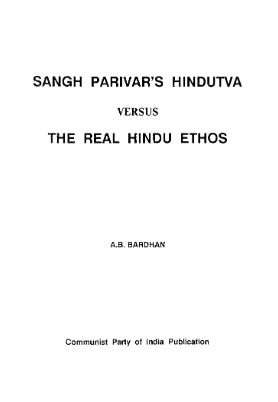Sangh Parivar’s Hindutva Versus The Real Hindu Ethos by AB Bardhan is a significant Odia novel published in 1992 that delves deep into the contrasting ideologies of Hindutva propagated by groups like the Sangh Parivar and the true essence of Hindu ethos as envisioned by prominent figures such as Mahatma Gandhi.
In the wake of the Babri Masjid demolition in 1992, tensions were running high in India regarding religious identity and nationalism. AB Bardhan, through his novel, explores the ideological battle between two perspectives on Hinduism. The Sangh Parivar’s version of Hindutva often emphasizes a militant and exclusionary form of Hindu nationalism, promoting a narrow conception of Hindu identity rooted in majoritarianism and cultural supremacy. This interpretation, marked by its aggressive rhetoric and calls for the protection of Hindu interests, stands in stark contrast to the inclusive and pluralistic ideals of the real Hindu ethos.
The novel likely portrays characters and narratives that embody these contrasting ideologies, showcasing the complexities of identity, belief, and social dynamics in a rapidly changing India. AB Bardhan may have drawn inspiration from historical events and philosophical underpinnings to weave a narrative that challenges readers to reflect on what it truly means to be Hindu in a diverse and multicultural society.
The year 1992 was a tumultuous period in India’s history, with the Babri Masjid incident serving as a flashpoint that exposed deep communal fault lines. Against this backdrop, AB Bardhan’s novel likely serves as a commentary on the dangers of politicizing religion and using it as a tool for division rather than unity. The author may have sought to highlight the importance of maintaining the secular fabric of the nation and upholding the values of coexistence and mutual respect among different communities.
In discussing the real Hindu ethos, the novel may draw upon the teachings and philosophies of figures like Mahatma Gandhi, who envisioned a harmonious society built on principles of truth, nonviolence, and tolerance. Gandhi’s interpretation of Hinduism emphasized the importance of selfless service, compassion, and universal brotherhood, transcending narrow boundaries of caste, creed, or religion. In contrast to the exclusivist nature of Hindutva, Gandhi’s ideals represent a more inclusive and humanistic approach to Hindu spirituality.
Overall, “Sangh Parivar’s Hindutva Versus The Real Hindu Ethos” by AB Bardhan is likely a thought-provoking narrative that engages with timely and contentious themes surrounding religion, nationalism, and identity in India. By exploring these contrasting ideologies within the context of historical events like the Babri Masjid demolition, the novel offers readers a valuable opportunity to reflect on the essence of Hinduism and the enduring relevance of pluralism and tolerance in a diverse society.
Books Info
| Books name | Sangh Parivar’s Hindutva Versus The Real Hindu Ethos |
| Author | AB Bardhan |
| No Of pages | 16 |
| Publisher | NA |
| Publication | 1992 |
| Printed At | NA |
| Distributor | NA |
Sangh Parivar’s Hindutva Versus The Real Hindu Ethos sample
Sangh Parivar’s Hindutva Versus The Real Hindu Ethos Full Pdf Download

